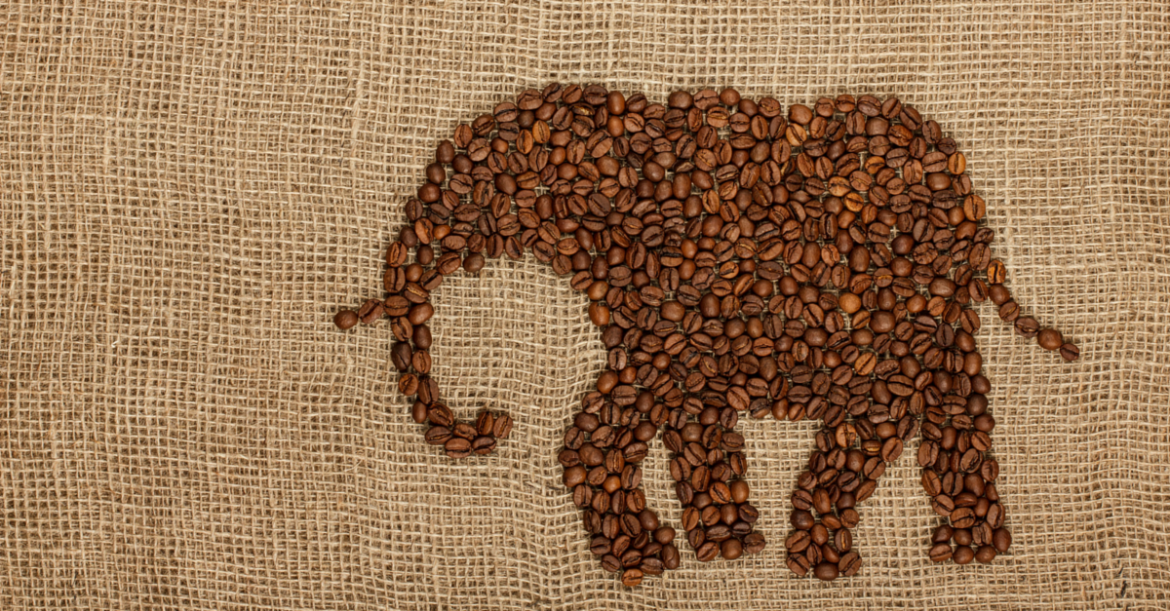What’s the rarest, most ethical, sustainable and most expensive coffee? Well, I found it without having to go to the Maldives or Thailand to get this java jewel. The Black Ivory Coffee campaign can be found on Indiegogo.com ~a rare treat and a true sustainability campaign. Elephants are key to the process in creating this wonderfully exotic and eco-friendly coffee.
The passion behind the poop is Blake Dinkin, a social entrepreneur whose mission is preserving the planet, giving back to a global community, animal conservation and offering coffee fit for a king or queen. I contacted Blake Dinkin for the inside story!
Founded ten years ago, Black Ivory Coffee has been developed through a process where coffee beans are naturally refined by Thai elephants. This is done by the Golden Triangle Asian Elephant Foundation in Chiang Saen, northern Thailand. (www.helpingelephants.org)
Mr. Dinkin told me it begins by selecting the best Thai Arabica beans that have been picked from an altitude as high as 1500 meters. Approximately 10,000 beans are picked for each kilogram of roasted coffee; thus, 33 kilograms of coffee cherries are required to produce just one kilogram of the coffee. Interestingly, approximately 10,000-beans/1 kg is the same for any coffee. What’s specific for Black ivory Coffee is the cherry to roasted bean ratio, which is huge at 33:1. The elephants break a lot of the coffee with their teeth. Beans are then deposited, however not all of them can be found in the tall grass. When elephants go for a swim, they tend to lighten their load, which costs the business hundreds of dollars. Beans are then hand sorted, and smaller beans are removed to ensure even roasting.
How does the process work? It takes 15-70 hours for the elephants to digest the cherries. Once deposited on the ground, they are handpicked by the wives of the Mahouts (elephant owners), sun-dried and then roasted. The Mahouts are paid per kilogram for their work. This provides valuable income generation for schooling, clothes and food, etc. The company also provides additional valuable income generation for the wives of the elephant owners. In terms of pay, the average coffee picker in Thailand is paid approximately 8 baht and the company pays between 85-100 baht/kilogram in addition to the above market prices paid for the fresh coffee cherries. What’s a bhat? http://www.youtube.com/watch?v=A2hxZxDpygI.
The reason why the company is named Black ivory Coffee is because of similar words like ivory that come to mind, such as polished, exotic, valuable, white, elephant and desirable. However, poaching may seem associated with Black Ivory Coffee, when in fact, Black Ivory Coffee are against poaching. Blake Dinkin wants to help elephants and their owners, which is why his company donates 8% of sales back to the Golden Triangle Asian Elephant Foundation. The money helps pay the salary of an elephant veterinarian, medicine to treat sick elephants, and the construction of an elephant laboratory.
According to Mr. Dinkin, “Black Ivory Coffee’s three goals are to offer a great cup of coffee, to create a beautiful presentation using a machine whose design dates back to 1840 and to make a positive social impact for Thai elephants and their owners, creating a transporting experience for coffee connoisseurs”
Currently, the only place in North America where you can buy the coffee is at The Elephant Story. Otherwise, you’ll have to visit one of the grand five star hotels in the Maldives or Thailand like Four Seasons, Ritz-Carlton, Anantara, Grand Hyatt Erawan, Peninsula, The Siam, The Pavilions Phuket, Paresa Resorts, Conrad Samuai and Napasai by Orient Express. Check out http://www.blackivorycoffee.com for more information. They will be expanding into other Asian countries shortly as well. One racetrack in the USA also gives it to their VIPs, but the name can’t be disclosed due to privacy issues.
The coffee is sold in a 35-gram pack, which serves 4.5 espresso cups. The retail price is approximately $50/pack it works out to be approximately USD 12/cup or 1450/kg. It takes 33 kg of coffee cherries to make 1 kg of Black Ivory Coffee. They only produced 200 kg for 2012, making it the rarest of coffees.
Although the brewing machine is produced today, its design dates back to 1840 which is instrumental in the process, needs a certain amount of coffee/water to work and this quantity fills 4.5 espresso size cups. Each package is set at 35 grams so the waiter can just open the pack, hand grind it and pour it into the grinder without measuring.
Black Ivory coffee is not sold online at this time, however if you go to the Indiegogo campaign, which runs until August 19th, you can be one of the rare ones to taste this coveted coffee. The Huffington Post, Travel and Leisure and CNN have talked about the brew. Now you can check out what other people are saying on Black Ivory Coffee’s Facebook.
 Food
Food Farmers
Farmers Sustainable Living
Sustainable Living Living Planet
Living Planet News
News